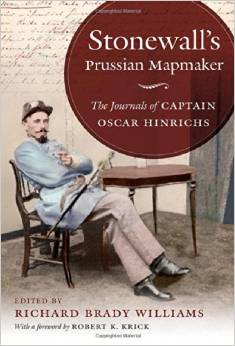Stonewall’s Prussian Mapmaker: The Journals of Captain Oscar Hinrichs edited by Richard Brady Williams. University of North Carolina Press, 2014. Cloth, ISBN: 978-1469614342. $45.00.

Mention mapmaking and Stonewall Jackson, and students of the Civil War will immediately think of Jedediah Hotchkiss; the appearance of this volume may change that seemingly automatic association. Oscar Hinrichs was born in Prussia, but his parents almost immediately migrated to the United States. After being sent back to Europe for an education, he returned to this country in 1853 as a civil engineer, took a job with the United States Coast Survey working in the Carolinas, and developed some strong southern loyalties. This in turn creates the narrative tension with which this book begins. In the summer of 1861, Hinrichs was doing some survey work in Maine but soon returned to New York where he was hounded by a detective seeking to prevent his defection to the Confederacy. Hinrichs’ combination memoir-journal-diary recounts his exciting escape through Maryland to seek a position in the Confederacy — and then continues through the end of the war.
Editor Richard Brady Williams has skillfully patched together the Hinrichs manuscripts (some written in German) into this fine volume that immediately becomes an indispensable source for studying the Army of Northern Virginia from the Peninsula campaign until the end of the war. Hinrichs was nothing if not opinionated; readers will enjoy and historians will quote scores of sharply worded assessments of Confederate generals and other officers. Hinrichs arrived in Richmond early in 1862, came under suspicion of being a spy, and became an engineer officer serving with Richard Ewell, Stonewall Jackson, John B. Gordon, and Jubal Early. Hinrichs greatly admired Jackson and always thought that other generals should follow Stonewall’s bold and aggressive approach to war.
Hinrichs’ assessments of such luminaries as Ewell and Early changed during the war. For example, he disapproved of Ewell (whom he considered quite gruff on their first encounter), but grew to admire the general. Hinrichs seldom hesitated to express his views in strong and direct language. D. H. Hill he considered “uncouth and ungentlemanly.” The general’s mind seemed “narrow and shallow.” Hinrichs thought him altogether unsuited for independent command. Deciding that even these harsh words did not go quite go far enough, he added that Hill was a “disgrace to the rank he now holds” (49). He was unimpressed with Turner Ashby and John B. Gordon; he had decidedly mixed opinions of P. G. T. Beauregard and Joseph E. Johnston; and he sometimes defended Braxton Bragg against that general’s legion of critics. After praising John Bell Hood earlier in the war, Hinrichs finally decided that the general was incapable of commanding anything larger than a division.
Hinrichs was a staunch Confederate, but perhaps because he suffered occasional bouts of depression seldom viewed the military situation through the lens of wishful thinking. He never hesitated to call out the incompetent and could even be critical of men he basically admired. In his view, too large a force had been wasted capturing Harpers Ferry during the Maryland campaign, and the delayed attacks at Gettysburg had proved fatal. During the fall of 1863, Hinrichs even suggested that George Gordon Meade might be getting the best of Robert E. Lee. He generally assessed Confederate prospects with cold-eyed realism. In contrast to many overly sanguine Confederates, Hinrichs readily acknowledged William Tecumseh Sherman’s great success as well as the odds Lee faced in trying to hold off Ulysses S. Grant. He recognized the possible necessity for the enlistment of black troops and that they would have to be freed.
There is much detail on army organization and movements in Hinrichs diary entries that will prove useful to historians. Hinrichs often writes matter-of-factly when he is not offering pointed opinions, but in places even this makes for poignant reading. For example, on returning to his quarters around midnight on February 6, 1865, Hinrichs discovered that the body of the recently married General John Pegram, killed during the fight at Hatcher’s Run, had been laid out on his bed.
Shortly after the surrender of Lee’s army, Hinrichs traveled to Washington, but was for a time detained by Union authorities on suspicion of involvement in the Lincoln assassination due to some false testimony by a Confederate deserter. Williams notes, however, that there is tantalizingly cryptic evidence of the captain’s connections with Confederate espionage, and that at one point Hinrichs proposed traveling to New York City to incite an insurrection. After the war, he returned to New York, married, and continued his career as a mapmaker. He ended up losing a government position and struggled financially. Less than a year after his wife’s death in 1891, Hinrichs committed suicide.
Williams has edited the Hinrichs documents in a restrained and helpful way, and a solid introduction (along with a foreword by Robert K. Krick) establishes the context. Aside from important information on all manner of subjects related to the Army of Northern Virginia, Stonewall’s Prussian Mapmaker is an interesting read in its own right.
George C. Rable is the Charles G. Summersell Chair in Southern History at the University of Alabama. He is the author of Fredericksburg! Fredericksburg! (2002).
